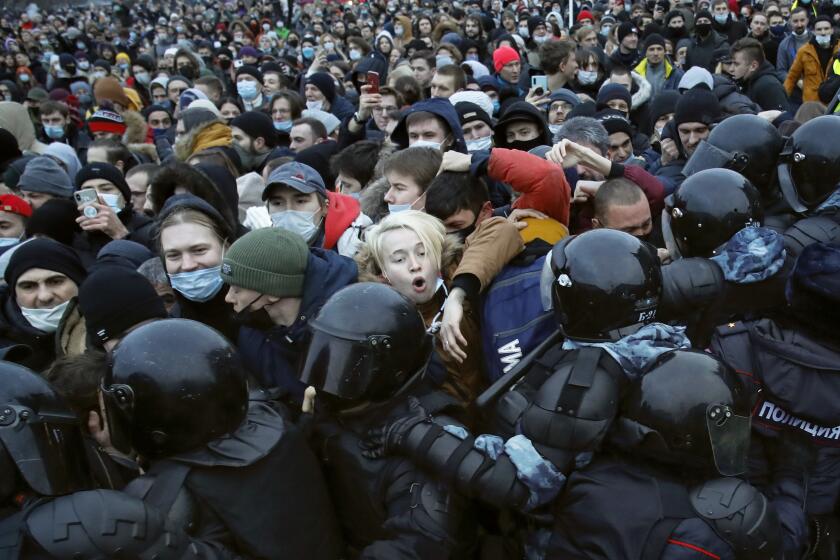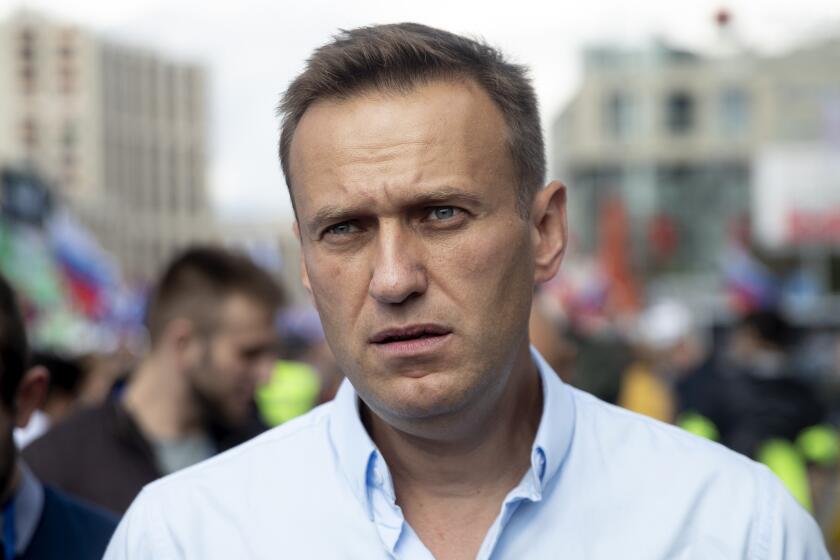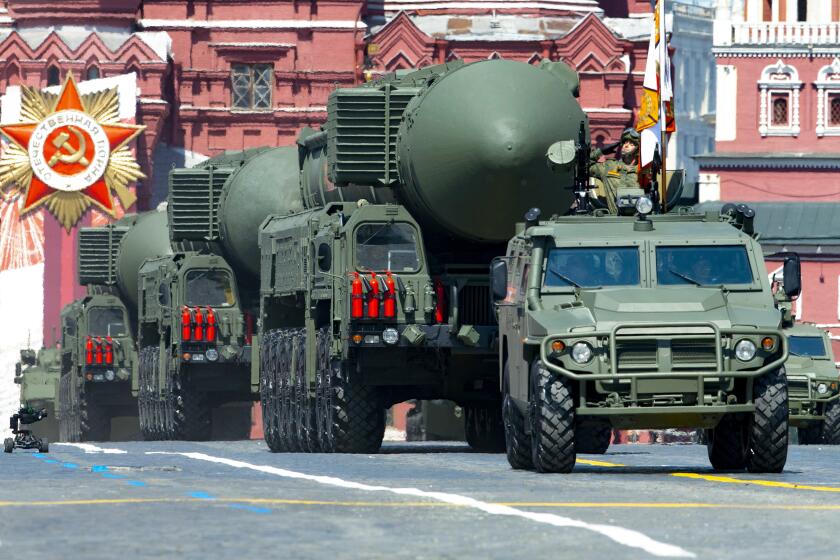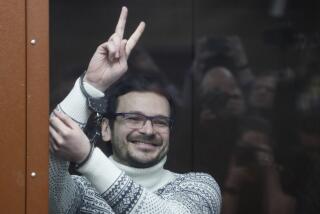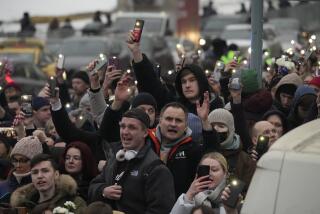Russian court rejects appeal of Navalny arrest ahead of more planned protests
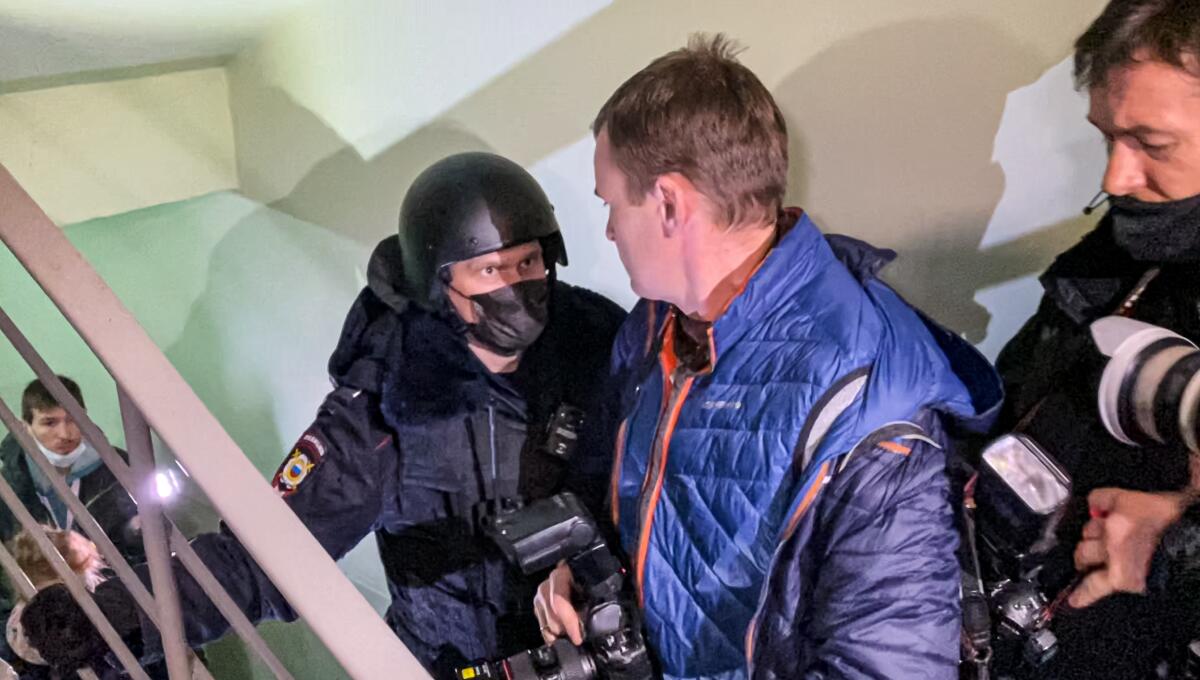
MOSCOW — A Russian court on Thursday rejected opposition leader Alexei Navalny’s appeal against his arrest as authorities detained several of his allies and issued warnings to social media companies about protests planned for this weekend.
Speaking to the court via video link from jail, Navalny denounced the criminal proceedings against him as part of government efforts to intimidate the opposition after tens of thousands of Russians swarmed the streets in more than 100 cities last weekend demanding his release. Nearly 4,000 people were reported arrested at those protests.
“You won’t succeed in scaring tens of millions of people who have been robbed by that government,” Navalny said.
The 44-year-old Navalny, the most well-known critic of President Vladimir Putin, was arrested Jan. 17 upon his return from Germany, where he spent five months recovering from nerve-agent poisoning, which he blames on the Kremlin. Russian authorities have rejected the accusations.
Navalny was ordered jailed for 30 days at the request of Russia’s penitentiary service, which accused him of violating probation terms stemming from a 2014 money-laundering conviction that he and other activists said was politically motivated. Navalny now also faces accusations in two separate criminal investigations.
During Thursday’s hearing at the Moscow Region Court, Navalny’s defense argued that he was undergoing rehabilitation in Germany and was unable to register with authorities, as required by his probation terms, during that period. His lawyers also contested his arrest, alleging that due process was repeatedly violated.
Protesters across Russia have pressed for authorities to release Putin critic Alexei Navalny
In his remarks via video link, Navalny said the decision to jail him after he landed in Moscow, at an impromptu court hearing held at a police station, was a mockery of justice.
“It was demonstrative lawlessness intended to scare me and all others,” he said.
In an apparent effort to thwart the next wave of rallies, set for Sunday, police on Wednesday searched Navalny’s apartment, a rented accommodation where Navalny’s wife, Yulia, has been living. Authorities also raided the residences of several of his associates and supporters.
Navalny’s brother Oleg; top ally Lyubov Sobol; Dr. Anastasia Vasilyeva, from the Navalny-backed Alliance of Doctors; and Maria Alyokhina, from the Pussy Riot punk collective, were detained for 48 hours as part of a criminal inquiry into alleged violations of coronavirus regulations during last weekend’s protests.
Past example shows that falling afoul of Putin can portend poison peril
Putin spokesman Dmitry Peskov said the searches and detentions were a legitimate part of police efforts to investigate the alleged violations during Saturday’s rallies.
“Law-enforcement agencies are doing their job,” Peskov said in a conference call with reporters. “There were numerous violations of Russian laws, and law-enforcement agencies are at work.”
Russian prosecutors also issued warnings on Thursday to Facebook, Google, Twitter, TikTok and Russian social networks demanding that they block calls for more protests.
“The state doesn’t want the social networks to become a platform for promoting such illegal actions,” Peskov said.
News Alerts
Get breaking news, investigations, analysis and more signature journalism from the Los Angeles Times in your inbox.
You may occasionally receive promotional content from the Los Angeles Times.
Asked if their refusal to remove such content could prompt Russian authorities to block them, Peskov responded that it would be up to relevant government agencies to consider a response. “All pros and cons will be weighed,” he said, “and, if necessary, measures envisaged by the law will be taken.”
This week, Russia’s state communications watchdog, Roskomnadzor, said it would fine Facebook, Instagram, Twitter, TikTok, YouTube and two Russian social networks for their failure to block calls on minors to join Saturday’s protests.
Moscow police Thursday issued a notice to the public not to join protests Sunday, warning that it would act resolutely to disperse unsanctioned rallies.
Speaking during the court hearing, Navalny thanked his supporters and said, “They are the last barrier preventing our country from sliding into the degradation.”
Russian lawmakers have quickly approved the extension of the last remaining Russia-U.S. nuclear arms control pact just days before it’s due to expire.
In a further challenge to Putin, two days after Navalny’s arrest, his organization released an extensive video report on a palatial seaside compound reportedly built for the president. It has been viewed more than 98 million times.
Navalny fell into a coma aboard a domestic flight from Siberia to Moscow on Aug. 20. He was transferred from a hospital in Siberia to a Berlin hospital two days later. Labs in Germany, France and Sweden and tests by the Organization for the Prohibition of Chemical Weapons established that he was exposed to the Soviet-era Novichok nerve agent.
Russian authorities have refused to open a full-fledged criminal inquiry, alleging a lack of evidence that Navalny was poisoned.
Navalny’s arrest and the harsh police actions at the protests have sparked criticism from the West and calls for his release. President Biden spoke about Navalny in a phone call with Putin on Tuesday.
Associated Press writer Kelvin Chan in London contributed to this report.
More to Read
Sign up for Essential California
The most important California stories and recommendations in your inbox every morning.
You may occasionally receive promotional content from the Los Angeles Times.
